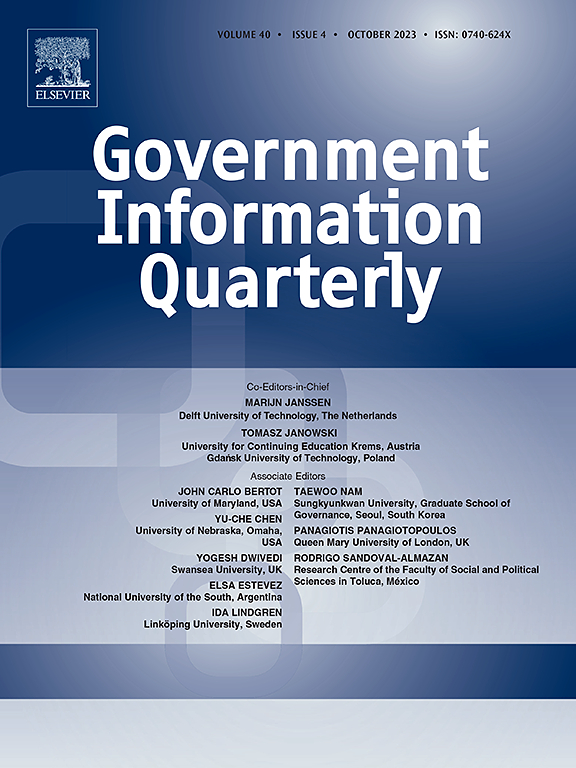Development and evaluation of an urban data governance reference model based on design science research
IF 10
1区 管理学
Q1 INFORMATION SCIENCE & LIBRARY SCIENCE
引用次数: 0
Abstract
In the urban context, data governance has only recently gained attention, though the increased importance of data with the emergence of smart cities is unprecedented. Data governance helps ensure the efficient management, utilization, and protection of data, all essential for enhancing service delivery, refining decision-making processes, and fostering trust in data integrity. This study presents a data governance reference model adapted to urban requirements – the urban data governance reference model – developed following the design science research paradigm. We describe the steps of the reference model development, from establishing a scientific theory base to analysis of the problem environment in 27 EU cities to the development process of the artifact and evaluation through expert interviews in 10 EU cities. The findings reveal that no reference model for urban data governance exists in the scientific literature. In practice, cities face challenges such as data silos, lack of interoperability, and redundancies, as well as a lack of data culture. Support for creating data governance programs is also lacking. The urban data governance reference model harmonizes technology, organization, and culture through four foundation layers and four pillars. Experts' evaluation of the reference model provides essential insights into its completeness, comprehensibility, applicability, and possible improvement measures for future research. It is highly adaptable and can serve as an orientation aid for cities implementing data governance.
基于设计科学研究的城市数据治理参考模型开发与评价
在城市环境中,数据治理直到最近才引起人们的关注,尽管随着智慧城市的出现,数据的重要性越来越高,这是前所未有的。数据治理有助于确保数据的有效管理、利用和保护,这对于增强服务交付、改进决策流程和培养对数据完整性的信任至关重要。本研究提出了一个适应城市需求的数据治理参考模型——城市数据治理参考模型。从建立科学的理论基础到分析27个欧盟城市的问题环境,再到通过专家访谈对10个欧盟城市进行评估,我们描述了参考模型开发的步骤。研究结果表明,科学文献中没有城市数据治理的参考模型。在实践中,城市面临着诸如数据孤岛、缺乏互操作性、冗余以及缺乏数据文化等挑战。也缺乏对创建数据治理程序的支持。城市数据治理参考模型通过四个基础层和四个支柱协调技术、组织和文化。专家对参考模型的评价为其完整性、可理解性、适用性以及未来研究可能的改进措施提供了重要的见解。它具有很强的适应性,可以作为城市实施数据治理的指导工具。
本文章由计算机程序翻译,如有差异,请以英文原文为准。
求助全文
约1分钟内获得全文
求助全文
来源期刊

Government Information Quarterly
INFORMATION SCIENCE & LIBRARY SCIENCE-
CiteScore
15.70
自引率
16.70%
发文量
106
期刊介绍:
Government Information Quarterly (GIQ) delves into the convergence of policy, information technology, government, and the public. It explores the impact of policies on government information flows, the role of technology in innovative government services, and the dynamic between citizens and governing bodies in the digital age. GIQ serves as a premier journal, disseminating high-quality research and insights that bridge the realms of policy, information technology, government, and public engagement.
 求助内容:
求助内容: 应助结果提醒方式:
应助结果提醒方式:


